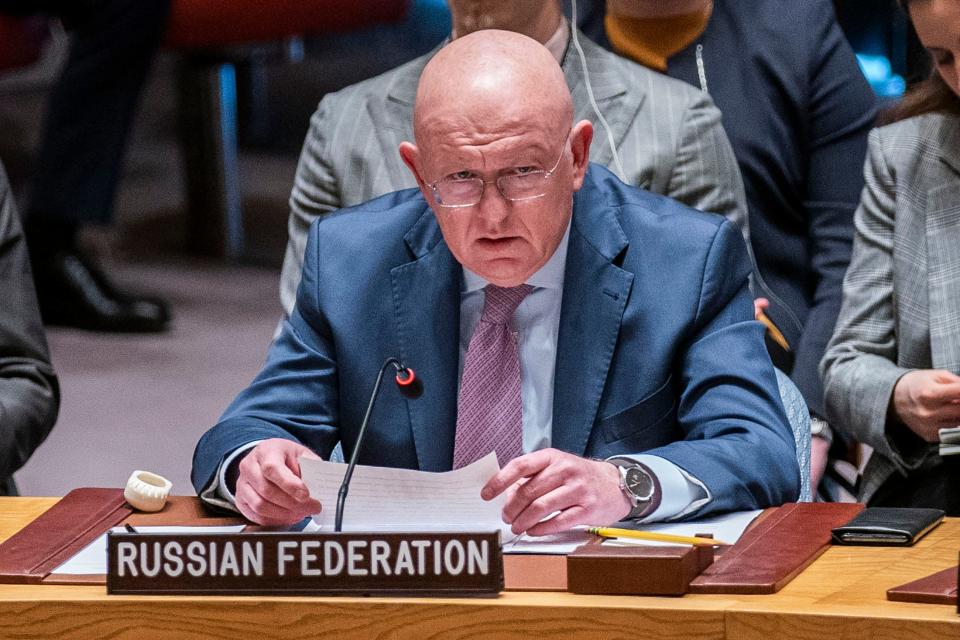Russia's top diplomat is blaming the US for the destruction of the Kakhovka dam, saying HIMARS attacks caused the breach

Russia's top diplomat on Tuesday blamed the US for the breach in the Kakhovka dam.
He claimed that Kyiv was "encouraged" by the West to flood the Dnipro River.
He said Ukraine used US-supplied HIMARS to attack the dam, an unlikely explanation for its collapse.
Russia's representative to the United Nations on Tuesday blamed the West for the breach of the critical Kakhovka dam it has controlled, claiming without evidence that US-supplied weapons caused the collapse.
Calling the breach a "terrorist plan," top Russian diplomat Vasily Nebenzya claimed Kyiv executed the attack while "sensing its total impunity and with the encouragement of its Western backers."
The dam's destruction on Tuesday has unleashed floods upon dozens of villages, and threatens to drain a crucial reservoir that supplies water to the Zaporizhzhia nuclear power plant. Ukraine and Russia have blamed each other for the apparent explosion at the hydroelectric dam that Russian occupied.
At a UN security council meeting, Nebenzya said earlier media reports recorded Ukrainian forces attacking the dam with HIMARS in December.
He was referring to a report by The Washington Post, published on December 29.
For this report, The Post interviewed Maj. Gen. Andriy Kovalchuk, the Ukrainian officer overseeing preparations for Kyiv's anticipated counteroffensive. The Post reported that Kovalchuk conducted a test strike with a HIMARS launcher targeting a floodgate at the Kakhovka dam. The goal was to see if creating three holes could raise downstream water levels enough to flood Russian positions, but not affect nearby settlements, per The Post.
The outlet wrote that Kovalchuk declared the test a success, but considered the action a last resort and held back.
Russia has provided no credible evidence that the destruction of the dam was caused by rocket artillery, and experts who spoke to the New York Times assessed the most plausible explanation of the destruction of the dam's steel-reinforced concrete middle was hundreds of pounds of explosive planted inside the structure.
Speaking of Washington Post article, Nebenzya claimed that Ukraine orchestrated the dam's destruction to pave the way for Kyiv's counteroffensive.
But he also continued to point the finger at Ukraine's allies.
"The West is used to doing the dirty work with other people's hands," Nebenzya told the Security Council.
On Kyiv's part, Ukrainian UN ambassador Sergiy Kyslytsya said it was "physically impossible" to destroy the Kakhovka dam from the outside.
"It was mined by the Russian occupiers and they blew it up," Kyslytsya said, in line with earlier claims from Ukraine that it found Russian forces mining the dam.
Meanwhile, the US said it's still unclear who caused the breach.
"We're not certain at all," Robert Wood, Deputy US ambassador to the UN, told reporters on Tuesday. "We hope to have more information in the coming days."
However, Wood added that it "doesn't make sense" for Ukraine to have carried out the attack. "Why would Ukraine do this to its own territory and people, flood its land, force tens of thousands of people to leave their homes?" he said.
Ukraine has issued evacuation orders for thousands of residents south of Kakhovka. Entire houses were filmed being washed away. The dam is also vital to the water supply of millions of people in Crimea, which Russia annexed in 2014.
The full consequences of the breach aren't immediately clear, UN Aid Chief Martin Griffiths told the Security Council.
"But it's already clear that it will have grave and far-reaching consequences for thousands of people in southern Ukraine on both sides of the front line through the loss of homes, food, safe water, and livelihoods," he said.
Read the original article on Business Insider

